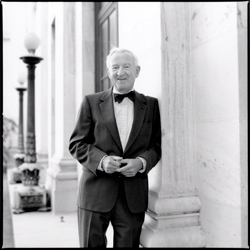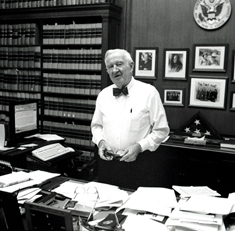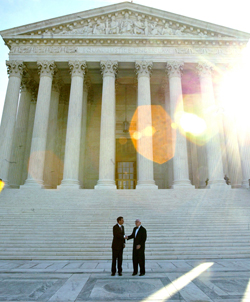Man of Moderation: Last Justice of ‘Greatest Generation,’ Says Farewell

Stevens in 1990 in the Supreme Court’s
courtyard. Photo by Janet Fries.
John Paul Stevens got one of his earliest lectures on politics, business and corruption long before he went to law school.
Born to Chicago gentry in 1920, Stevens grew up in the city’s Hyde Park neighborhood, known for its diversity, intellectual achievement and wealth. His family made its money in the Illinois Life Insurance Co., and owned the LaSalle Hotel and the Stevens Hotel, once the world’s largest.
That changed in 1933, when his father, Ernest, was charged with attempting to siphon cash from the family’s life insurance business to make bond payments on the insolvent Stevens Hotel. His brother, Raymond Stevens, and their father, James Stevens, were named as co-conspirators. Raymond committed suicide shortly after his arrest, and James suffered a stroke.
After being charged, Ernest Stevens obtained European passports for himself, his children and his wife, and that led the state’s attorney to obtain a bench warrant for his arrest. Ernest was arrested at his home, while son John Paul, then 13, was upstairs.
His father got out on bail. Two weeks later four men broke into the Stevens home seeking cash they claimed had been hidden from authorities. The family was led to the home’s library at gunpoint and forced to open a safe, according to news reports. Ernest suspected that the men were really agents of the state’s attorney, looking for evidence without a warrant.
A year later, John Paul Stevens was in the courtroom when a jury found his father guilty of embezzling $1.3 million from Illinois Life Insurance. The Stevens family felt it was wronged by Depression-era prosecutors and persecuted by the Chicago press, according to published accounts.
The Illinois Supreme Court later overturned Ernest’s conviction, saying the evidence didn’t support the verdict. Embezzlement, the court emphasized, is usually done in secret, and there was no evidence that the defendant attempted to disguise the funds he took from Illinois Life Insurance to pay on the hotel bonds. In fact, the deals were approved by the insurance company’s directors.
“In Stevens’ view in that case, justice was done in the end,” says Bill Barnhart, who wrote the biography John Paul Stevens: An Independent Life with former Illinois state legislator Gene Schlickman. “How many people have that experience in their lives?
Indeed, how many people have taken to heart that kind of childhood trauma and gone on to become a justice of the U.S. Supreme Court?
Stevens announced his retirement April 9 after 35 years on the high court. It is the second-longest tenure since William O. Douglas—whom Stevens replaced—left in 1975.

Stevens, second row, second from right, as a clerk in 1947-1948.
(Collection of the Supreme Court of the United States)
GENTLEMAN MEETS MACHINE
Many describe Stevens as a scholar who excels at traditionally highbrow activities such as bridge, tennis and golf, and as a gentleman whose behavior reflects his upbringing. That, plus the grittier experience of living and practicing law in a city known for greased palms and political machines, made Stevens the justice he is. It also made him a Republican.
“When he was growing up in Chicago, politics were dominated by the corrupt Democrat machine,” says Lawrence Rosenthal, who clerked for Stevens on the Supreme Court and a former deputy in the city of Chicago’s Law Department.
“That’s not to say those machines did all bad things—a lot of people would say the machine did some good things,” adds Rosenthal, now a professor at Chapman University School of Law in Orange, Calif.
“But if you believed in good government and were a reformer—a particular kind of reformer who wanted to clean the stables—you were a Republican in Chicago.”
Ernest Stevens endured. Conrad Hilton eventually bought the Stevens Hotel, now the Hilton Chicago, and Ernest became manager of the Hyde Park Hotel. John Paul Stevens went on to the University of Chicago, followed by a stint as a code breaker with the U.S. Navy during World War II. After discharge, he entered Northwestern University School of Law, mostly paid for with the GI Bill.
Stevens was editor-in-chief of the school’s law review, and when he graduated in 1947—on an accelerated, two-year plan—he had the highest grades in the law school’s history.
His next few years were spent between Washington and Chicago, and included a clerkship with Justice Wiley Rutledge. During that time Stevens got to know Abner Mikva, who clerked for Justice Sherman Minton. Although Mikva is a Democrat, he and Stevens bonded through a connection to the University of Chicago, where Mikva got his law degree.
“He’s someone who’s just Boy Scout honest, who thinks you shouldn’t ever lie about anything,” says Mikva, who later served as an Illinois state representative and a U.S. congressman.
In the early 1950s, Mikva adds, he and Stevens often discussed the scandal involving members of President Harry Truman’s administration who were accused of handing out favors in exchange for fur coats and deep freezers.
“He wasn’t someone who took glee from the other party’s hanky-panky. He was very shocked,” Mikva says of Stevens. “And [those incidents] were minor compared to the ones that came later.”
Stevens and his first wife, Elizabeth, came back to Chicago for the long term, and in 1952 he opened a law practice specializing in antitrust. Stevens became an active member of the Chicago Bar Association, and when he wasn’t working he could often be found at Chicago’s Beverly Country Club playing duplicate bridge.

Stevens in his chambers in 2002.
(Photo by David Hume Kennerly/Getty Images)
AN EDUCATIONAL SCANDAL
In 1969, Stevens was named special counsel in a judicial bribery case. Chicago gadfly Sherman Skolnick, known widely for conspiracy theories and pro se lawsuits, had charged that two members of the Illinois Supreme Court took bribes from a Chicago lawyer and Democratic Party insider named Ted Isaacs. Skolnick claimed that two justices had received stock and fees from a bank associated with Isaacs while the fate of a criminal case involving Isaacs was pending before their court. The case alleged that Isaacs, while director of the Illinois Department of Revenue, drew service fees from a printing company that got more than $1 million in contracts from the state.
Skolnick filed a motion with the Illinois Supreme Court seeking an investigation. He alleged that while the Isaacs case was being considered, shares of the Civic Center Bank had been transferred through a lobbyist to Justice Ray Klingbiel, and that another justice, Roy J. Solfisburg Jr., secretly acted as the Chicago bank’s lawyer. Isaacs had helped charter the bank.
The media picked up the story, the state House called for an investigation, and the court granted Skolnick’s motion. The Illinois Courts Commission had the authority to remove a state court judge for cause, but not until it was convened by the Illinois Supreme Court. The court handed the investigation over to the Chicago Bar Association and the Illinois State Bar Association.
Finding special counsel was difficult. Most lawyers didn’t want to get involved for fear of retaliation. And the potential for conflicts was significant at law firms. As an antitrust lawyer, Stevens didn’t practice in state court. A Republican, he was seen by friends as apolitical. So Stevens agreed to serve as the special commission’s counsel; the work was done pro bono.
Stevens “wasn’t looking to use the job as a public steppingstone,” says Judge William J. Bauer of the 7th U.S. Circuit Court of Appeals at Chicago, who was then a state judge in DuPage County, Ill., and an active member of the Republican Party. “He didn’t have an ax to grind.”
Kenneth A. Manaster, a professor at California’s Santa Clara University School of Law, worked with Stevens on the investigation. He wrote a book about the experience, Illinois Justice: The Scandal of 1969 and the Rise of John Paul Stevens.
At the time, Manaster didn’t know about the Stevens family’s history with the Illinois Supreme Court. Today, it intrigues him.
“He had to have a richer appreciation of what the practice of law can be about than most people,” Manaster says. “There are so many levels of ability and honesty in the Chicago legal system, and you see the best and worst of lawyering in a climate like that.”
Like Manaster, most of the lawyers assisting Stevens were young associates, loaned by their law firms for the summer. The team had only June and July of 1969 to complete the investigation.
Manaster had no deposition experience but still was given the task of deposing a former bank employee, who prepared lists of the bank’s original stock subscribers and the issuance of stock certificates.
Stevens, Manaster says, “started with the premise that we were honest and capable, and that enabled a bunch of us to accomplish more than we ever thought we could have.”
When the investigation concluded, Stevens found Isaacs, Klingbiel and Solfisburg guilty of gross impropriety. The commission, based on Stevens’ findings, urged the justices to resign. They did, two days later, without publicly acknowledging any wrongdoing. Stevens’ findings did not attack the Illinois Supreme Court opinion that refused to reinstate Isaacs’ criminal case.
The foreword for Manaster’s book is authored by Stevens. He mentions that unlike most of the Supreme Court justices, he does not participate in the cert pool, where clerks review petitions and recommend to the court whether they should be granted. Stevens wants his own staff to consider the petitions—including the “so-called pro se” petitions—on their own.
“My memory of the unexpected merit that we found in the allegations made by Sherman Skolnick has remained a powerful reminder that categorical prohibitions against repetitive filings can create a real risk of injustice,” Stevens wrote.
BENCH-BOUND
After the commission findings, Stevens’ reputation outside his antitrust practice grew. He was named second vice-president of the Chicago Bar Association and in 1970 was appointed to the 7th Circuit. The nomination was put forth by Charles H. Percy, a Republican U.S. senator and a University of Chicago classmate.
There was another connection as well. Percy had run for Illinois governor and was defeated by Democrat Otto Kerner. Isaacs had been Kerner’s campaign manager, and it was Kerner who appointed Isaacs to head the Illinois Department of Revenue.
When Stevens got to the 7th Circuit, Kerner was already there—President Lyndon Johnson had appointed him in 1968. According to Manaster’s book, Stevens described Kerner as “totally courteous and friendly,” and the two never discussed Isaacs or the investigation.
Kerner and Stevens sat on the 7th Circuit until Kerner resigned in 1974. He was found guilty of accepting bribes from an Illinois racetrack owner during his term as governor. Isaacs was also implicated, and the alleged bribes took the form of stock. The information was discovered after the racetrack owner deducted the stock value from her federal income tax returns, based on her belief that the payoff was a necessary expense to do business in Illinois.
“I think [Stevens] was appalled. He was on the court of appeals with Kerner, and Kerner was well-liked by everyone,” says Sam Adam Sr., a high-profile criminal defense lawyer in Chicago. Adam, who now represents former Illinois Gov. Rod Blagojevich, represented a lobbyist in the Skolnick affair.
“To think Kerner would do something like that,” adds Adam, “it probably made Justice Stevens say, ‘Who can you really trust?’ ”

Stevens, second from right, during his confirmation hearing in 1975. (Associated Press)
In 1975 Stevens got on the short list to replace Justice Douglas. He was supported by Edward H. Levi, the attorney general in President Gerald Ford’s administration. Stevens and Levi knew each other through University of Chicago connections; Levi had been a professor and dean with the law school, and he hired Stevens to teach an antitrust course there.
Don Reuben, then Kirkland & Ellis’ managing partner, was a member of the ABA’s Standing Committee on the Federal Judiciary, and was tasked with interviewing Stevens. Reuben had represented Klingbiel and Solfisburg in the commission matter. And before that, Reuben had opposed Stevens as counsel.
“He was very aggressive and thorough, and all business,” Reuben says. “He’d throw the kitchen sink at his opponent.”
The interview took place at Stevens’ home in the Chicago suburb of Burr Ridge.
“It was colder than hell, and I caught him carrying some wood he had apparently chopped down,” says Reuben, who is now of counsel at Chicago’s Chico & Nunes. The two men entered the house, Stevens put the wood on the fire, and they sat down to talk.
“He was very gracious—and very straightforward,” Reuben says of Stevens. “He didn’t feel like he was under pressure or nervous about getting the job.” Ford wanted information about Stevens and the other potential nominee, 7th Circuit Judge Philip Tone, right away, Reuben recalls.
“Usually with the ABA, everybody would go out and talk to every lawyer who had appeared before the nominee,” he says. Instead, Reuben read all of the nominees’ opinions, and he presented his findings to Warren Christopher, then a Los Angeles lawyer who headed the ABA’s judiciary committee.
Two days later, Stevens’ name was submitted as the Supreme Court nominee. Some surmised that after Watergate, Ford wanted a justice who would restore confidence in the country.
“Ford immediately fell in love with Stevens. He was his kind of guy,” says Mikva, who was then a U.S. congressman. “I wouldn’t say it was a surprise, but no one ever said Stevens was the obvious appointee.”
During Senate Judiciary Committee hearings, Stevens was quizzed about his stance on the Equal Rights Amendment and the death penalty. He stated neutrality on both and was confirmed in December 1975.
Mikva was later appointed to the U.S. Court of Appeals for the District of Columbia Circuit, by President Jimmy Carter, and retired in 1994 to serve as White House counsel. He says he and Stevens often talk about Chicago. Before Mikva became a judge, Stevens refused to discuss politics.
“He was more particular about it than a lot of them,” Mikva says.
“He’s not someone who’s the life of the party or comes up with one-liners. He’s just a very quiet, gentlemanly person,” Mikva adds. “When you read some of his dissents, you realize that some of his colleagues are upsetting him to no end.”

Stevens with Chief Justice John Roberts after his 2005 investiture ceremony. (Photo by Dennis Brack/Bloomberg via Getty Images)
FULL CIRCLE
Today, Stevens lives with his second wife, Maryan, in Virginia. The couple also have a place in Florida. But Stevens, a Cubs fan, still considers Chicago home, say those who know him, and the city’s political culture continues to touch him. And during this, his final term on the Supreme Court, the issue of corruption will come full circle in the case of Conrad Black v. U.S.
Black, a newspaper executive who in 2007 was convicted of fraud in the Northern District of Illinois, is challenging the application of the “honest services” fraud provision under which he was tried.
The clause, aimed at combating corrupt political influence, was added by Congress after the Supreme Court ruled in a 1987 case, U.S. v. McNally, that mail fraud was limited to schemes involving money or property. Stevens authored a dissent.
Many predict that this term the Supreme Court will again knock down or significantly alter the honest-services provision as unconstitutionally vague. And many predict that Stevens will, once again, write a dissent.
Barnhart, a former business writer and editor, believes it all comes back to the political realities Stevens experienced in Chicago.
“I think he believes Illinois has a real problem in this regard, with people taking advantage of their positions,” Barnhart says. “I think he’s very observant of politics.”
More about Justice Stevens in the ABA Journal:
Practical Meaning: As the Court Shifted Right, Stevens Kept His Place
Who Will Replace Stevens? Three Likely Picks Emerge, as Others Engage in ‘Bizarro’ Speculation



